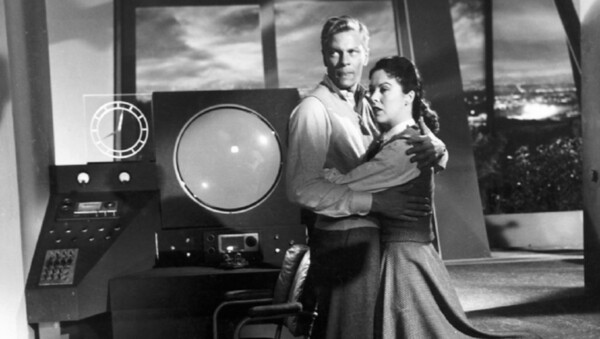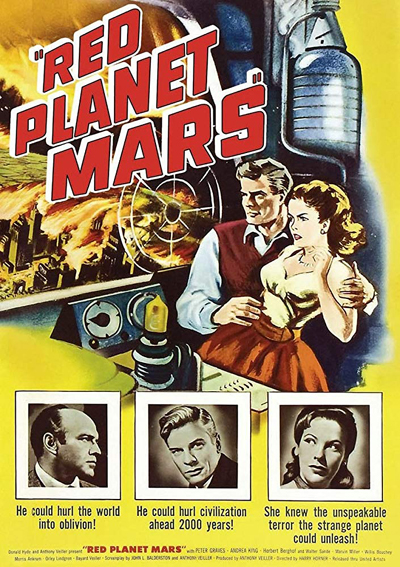Del reviews ‘Red Planet Mars’

Image courtesy of United Artists.
Del reviews ‘Red Planet Mars’
“Red Planet Mars” Starring Peter Graves, Andrea King and Herbert Berghof. Directed by Harry Horner. 87 minutes. Rated approved.
Del’s take
Maybe you’ve noticed I’m reviewing more Netflix, Prime and Hulu offerings these days. That’s no accident.
My MoviePass account expires at the end of this month and I won’t be renewing. When I first joined, the MoviePass deal was unbeatable – watch as many movies as you like in one month for a piddling $7. I wondered how they could make money and they didn’t. Soon they were altering the terms, adding steps and otherwise making it impossible to use your MoviePass for anything but low-rated matinees only once per week. With my new work schedule I could not have seen more than one movie per month, if that. Not much of a deal.
I subscribe to Netflix, Prime, Hulu, Shudder and Curiosity Stream. I can also choose from Vudu and Tubi TV. Needless to say I am not deprived of video content.
But finding the good ones can be a challenge. More than once I’ve searched Google for the best hidden gems on Netflix. I even have a browser extension that lets me search all the “hidden” categories Netflix does not include with its interface.
It stands to reason if I am having this problem, others likely are too. And that is the direction I am taking “Movie Faceoff.”

I will continue to review theatrical releases when I see them, and if I can ever coax Mladen away from the Great American Novel he’s working on, we’ll do them together. Meantime, I am reviewing some of the gems – and dogs – I find on my streaming services. And that brings me to this latest offering, “Red Planet Mars.”
“Red Planet Mars” is one of the most remarkable science fiction movies I have ever seen. Released in 1952 by United Artists, the movie stars a very young Peter Graves at the height of his Nordic grandeur.
The basic plot of the story is as follows: Astronomers spot what appear to be artificial canals on Mars that are transporting water from a rapidly diminishing polar ice cap. At the same time an American scientist (Graves) has established a kind of crude radio communication with the inhabitants.
At first, the communication is a simple repetition of signals sent from Earth. But Graves’ son, Stewart (Orley Lindgren) suggests transmitting the numerical value of pi to see if the Martians, if they are indeed Martians, will carry those values to the next decimal point. They do, and a dialogue is established after the cryptographers who decoded the Japanese military signals during World War II figure out how to interpret their language.
The Martians soon reveal an astonishing grasp of science, informing Graves that they live to be 300 years old, use cosmic energy as an energy source and grow enough food on a single acre to feed an entire city.
When these messages are revealed to the world, the world responds with panic and hysteria. Farmers, afraid their crops will be rendered valueless by new growing methods, demand government compensation. The oil industry freaks out (they wouldn’t do THAT, would they) and the medical community has a shit fit. The stock market collapses, riots spread across the country and the western world grinds to a halt.
Simultaneously an evil subplot is playing out. The Russians have a spy listening in on the broadcasts, a Nazi scientist who invented the technology that enables Graves to contact the Martians. The Russians intend to use the chaos as a means to subjugate the west and take over the world.
That is until the messages from Mars detour from the standard our-technology-is-superior-to-yours script and move off in a weird, unanticipated direction. Tables get turned and “Red Planet Mars” becomes something that rises above the modest aspirations of a killer B movie.
The clothes, home furnishings and cars are vintage 1952, but the giant flat-panel TV mounted on Graves’ wall is anything but, suggesting “Red Planet Mars” is set in an alternate universe.
But what’s astonishing about the movie is its willingness to address the deep issues of first contact, or the Cold War conflict between east and west. It does so in surprisingly thoughtful ways, so atypical of the ’50s B movies with their bug-eyed monsters and giant insect predators.
Don’t get me wrong. I’m not saying “Red Planet Mars” is a “good” movie. It’s definitely a product of its time. The viewer must make a deal with himself to overlook the overacting, the offensive patriarchal viewpoints, crappy special effects and script clinkers so common of movies of that day. But do that and you may be surprised.
I will say I liked the movie a lot. It entertained me right to the end.
I would grade “Red Planet Mars” at B+ purely on the merits of its ambition.
Stone is a former journalist and author.